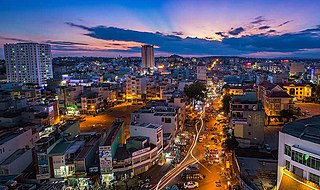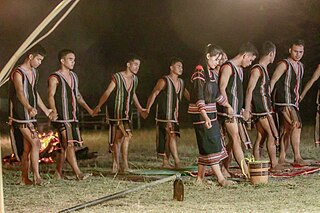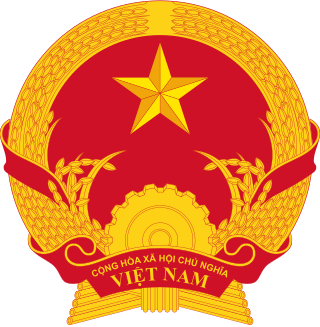External links
- Khmerkrom.com
- The Montagnard Foundation, Inc.
- Relatives of Kok Ksor forced to confess 'wrongdoings' in Vietnam
- Fostering a revolution?
- Vietnam's Tribal Injustice
- Transnational Radical Party
Kok Ksor (Jarai: Ksor Kok, born 1945 in Gia Lai Province, in the Central Highlands of Vietnam, died in USA on 9 January 2019), was a member of the Jarai ethnic group and the President of the Montagnard Foundation, Inc., an organization, begun as an RSO at the University of Chicago, which states that its mission is to preserve the lives, rights and culture of the Montagnard people.
Kok Ksor was also a member of the Transnational Radical Party (TRP), a non-government agency that investigates human rights abuses in the world.

The Transnational Radical Party (TRP), whose official name is Nonviolent Radical Party, Transnational and Transparty (NRPTT), is a political association of citizens, members of parliament and members of government of various national and political backgrounds who intend to adopt nonviolent means to create an effective body of international law with respect for individuals, human, civil and political rights, as well as the affirmation of democracy and political freedom in the world. The TRP does not participate in elections and, despite being named "party", is a non-governmental organization (NGO), with consultative status at the Economic and Social Council (ECOSOC) of the United Nations (UN) since 1995, adept in building synergies among political forces aimed at achieving the goals of its congressional motions.

Montagnard is an umbrella term for the various indigenous peoples of the Central Highlands of Vietnam. The French term Montagnard ( ) signifies a mountain dweller, and is a carryover from the French colonial period in Vietnam. In Vietnamese, they are known by the term người Thượng, although this term can also be applied to other minority ethnic groups in Vietnam. In modern Vietnam, both terms are archaic, and indigenous ethnic groups are referred to as đồng bào or người dân tộc thiểu số. Earlier they were referred to pejoratively as the mọi. Sometimes the term Degar is used for the group as well. Most of those living in the United States refer to themselves as Montagnards, while those living in Vietnam refer to themselves by their individual ethnic group.

The Society of the Friends of the Constitution, renamed the Society of the Jacobins, Friends of Freedom and Equality after 1792 and commonly known as the Jacobin Club or simply the Jacobins, was the most influential political club during the French Revolution of 1789. The period of its political ascendancy includes the Reign of Terror, during which well over 10,000 people were put on trial and executed in France, many for political crimes.

The Montagnard Foundation, Inc. is a political organization whose mission is to protect the rights of the Montagnard/Degar peoples of Vietnam, who belong to over thirty indigenous ethnic groups in the Central Highlands. It is a non-profit organization, founded in 1990 and based in South Carolina in the United States designated as a Militant group by Vietnam. The Montagnard Foundation has spoken out against Vietnam's policies that affected the Montagnards. The organization was designated as a separatist group by the Vietnamese government.

Marco Pannella was an Italian politician, journalist and activist. He was well known in his country for his nonviolence and civil rights' campaigns, like the right to divorce, the right to abortion, the legalization of cannabis and the abolition of nuclear power. Internationally, he supported human rights and self-determination causes, like the Tibetan independence and persecution of Christians in Vietnam.

Pleiku is a city in central Vietnam, located in the Central Highlands region. It is the capital of the Gia Lai Province. Many years ago, it was inhabited primarily by the Bahnar and Jarai ethnic groups, sometimes known as the Montagnards or Degar, although now it is inhabited primarily by the Kinh ethnic group. The city is the centre of the urban district of Pleiku which covers an area of 261 km².
Protestants in Vietnam are a religious minority, constituting 1% of the population in 2022. Though its numbers are small, Protestantism is the country's fastest-growing religion, growing at a rate of 600% in the early 2000s.

Jarai people or Dega are an Austronesian indigenous people and ethnic group native to Vietnam's Central Highlands, as well as in the Cambodian northeast Province of Ratanakiri. During the Vietnam War, many Jarai persons, as well as members of other Montagnard groups, collaborated with US Special Forces, and many were resettled with their families in the United States, particularly in North Carolina, after the war.

Human rights in Vietnam are among the poorest in the world, as considered by various domestic and international academics, dissidents and non-governmental organizations (NGOs) such as Amnesty International (AI), Human Rights Watch (HRW), and the United Nations High Commissioner for Human Rights (OHCHR).
Jarai is a Malayo-Polynesian language spoken by the Jarai people of Vietnam and Cambodia. The speakers of Jarai number approximately 530,000, not including other possible Jarai communities in countries other than Vietnam and Cambodia such as United States of America. They are the largest of the upland ethnic groups of Vietnam's Central Highlands known as Degar or Montagnards, and 25 per cent of the population in the Cambodian province of Ratanakiri.
Marino Busdachin was an Italian politician and human rights activist.

The Mobile Strike Force Command, or MIKE Force, was a key component of United States Army Special Forces in the Vietnam War. They served with indigenous soldiers selected and trained through the largely minority Civilian Irregular Defense Group (CIDG) and were led by American Special Forces and Australian Army Training Team Vietnam (AATTV) personnel. MIKE Force was a force multiplier, operating what is today called a foreign internal defense mission.

The United Front for the Liberation of Oppressed Races was an organization whose objective was autonomy for various indigenous peoples and ethnic minorities in South Vietnam, including the Montagnards in the Central Highlands, the Chams in Central Vietnam, and the Khmer Krom in Southern Vietnam. Initially a political movement, after 1969 it evolved into a fragmented guerrilla group that carried on simultaneous insurgencies against the governments of South Vietnam under President Nguyen Van Thieu and North Vietnam of Ho Chi Minh. Opposed to all forms of Vietnamese rule, FULRO fought against both sides in the Vietnam War against the Soviet-aligned North and the American-aligned South at the same time. FULRO's primary supporter during the 1960s and early 1970s conflict in Southeast Asia was Cambodia, with some aid sent by the People's Republic of China during the period of the Third Indochina War.

The Khmer Loeu is the collective name given to the various indigenous ethnic groups residing in the highlands of Cambodia. The Khmer Loeu are found mainly in the northeastern provinces of Ratanakiri, Stung Treng, and Mondulkiri. Most of the highland groups are Mon-Khmer peoples and are distantly related, to one degree or another, to the Khmer. Two of the Khmer Loeu groups are Chamic peoples, a branch of the Austronesian peoples, and have a very different linguistic and cultural background. The Mon–Khmer-speaking tribes are the aboriginal inhabitants of mainland Southeast Asia, their ancestors having trickled into the area from the northwest during the prehistoric metal ages. The Austronesian-speaking groups, Rade and Jarai, are descendants of the Malayo-Polynesian peoples who came to what is now coastal Vietnam; they established the Champa kingdoms, and after their decline migrated west over the Annamite Range, dispersing between the Mon–Khmer groups.

The Khmers Kampuchea-Krom Federation (KKF) is an organization that self-declares as representing the indigenous Khmer Krom peoples living in the Mekong Delta of Vietnam. Its primary mission is to advocate for human rights, religious freedom, and self-determination and independence through peaceful means and international laws.
Racism in Vietnam has been mainly directed by the majority and dominant ethnic Vietnamese Kinh against ethnic minorities such as Degars (Montagnards), Chams and the Khmer Krom. It has also been directed against black people from other countries around the world as well.
The United Front for the Liberation of Oppressed Races waged a nearly three decade long insurgency against the governments of North and South Vietnam, and later the unified Socialist Republic of Vietnam. The FULRO insurgents represented the interests of indigenous Muslim and Hindu Cham, Montagnards, and Buddhist Khmer Krom against the ethnic Kinh Vietnamese. They were supported and equipped by China and Cambodia according to those countries' interests in the Indochina Wars.

The native inhabitants of the Central Highlands of Vietnam are known as the Montagnard. The Vietnamese conquered the Central Highlands during their "march to the south". Ethnic Vietnamese (Kinh) people now outnumber the indigenous Degars after state-sponsored colonization directed by both the government of South Vietnam and the current Communist government of unified Vietnam. The Montagnards have engaged in conflicts with the Vietnamese, from the anti-Communist South Vietnamese government, the Viet Cong, to the Communist government of unified Vietnam. There are contrasting views on this issue, as the constitution of the government of Vietnam states "Article 36 of the Constitution, the state invests heavily in education and supports various preferential programmes for ethnic minorities, like ethnic minority boarding schools, lower entry requirements and quota for minorities." Both the initial 1945 constitution and the revised 1992 constitution of North Vietnam and the successor state the Socialist Republic of Vietnam stated that all minority groups in Vietnam have the right to maintain their mother tongues in their schooling as well as to use their languages to preserve their ethnic cultures and values, although the degree of enforcement remains ongoingly debated due to complicated nature.

The Montagnard country of South Indochina, sometimes abbreviated as PMSI, was an autonomous territory of French Indochina, and an autonomous federation within the French Union, created in 1946 following the French reconquest of the Central Highlands from the Democratic Republic of Vietnam during the First Indochina War. The territory was supposed to be an autonomous homeland of the Montagnard people within French Indochina, but existed mainly to serve French colonial interests in the region.

The Austroasiatic crossbow which is also known as the Hmong crossbow, the Jarai crossbow, or the Angkorian crossbow is a crossbow used for war and for hunting in Southeastern Asia. It has become a symbol of pride and identity for ethnic groups from Myanmar (Burma) to the confines of Indochina.